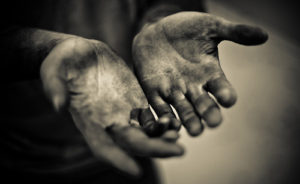 But He [Christ] became poor with His emptying, humiliation, and assumption of the form of a servant. For that reason, He was born poor in a stable, He rested in the lap of a poor mother, He lay down in a poor hut. The Wise Men gave Him a gift of gold. He was presented to the Lord with a pair of turtledoves, which was the gift of poor people. As a poor boy, He was reared in the home of His parents. He was considered the son of a poor carpenter. He felt poverty in His fasting. He did not have His own dwelling place. He was stripped of His clothing on the cross and finally was laid in a grave that belonged to someone else. All of these have to do with Christ’s poverty and emptying. But with this poverty He made us rich. Just as He earned life for us with His death, so He restored heavenly riches to us with His poverty. For this reason His poverty is set before us as material for our happiness (Zech. 9:9). Christ’s poverty is our patrimony, our savings in life, our traveling allowance [viaticum] in death, because with His poverty He acquired for us heavenly riches.
But He [Christ] became poor with His emptying, humiliation, and assumption of the form of a servant. For that reason, He was born poor in a stable, He rested in the lap of a poor mother, He lay down in a poor hut. The Wise Men gave Him a gift of gold. He was presented to the Lord with a pair of turtledoves, which was the gift of poor people. As a poor boy, He was reared in the home of His parents. He was considered the son of a poor carpenter. He felt poverty in His fasting. He did not have His own dwelling place. He was stripped of His clothing on the cross and finally was laid in a grave that belonged to someone else. All of these have to do with Christ’s poverty and emptying. But with this poverty He made us rich. Just as He earned life for us with His death, so He restored heavenly riches to us with His poverty. For this reason His poverty is set before us as material for our happiness (Zech. 9:9). Christ’s poverty is our patrimony, our savings in life, our traveling allowance [viaticum] in death, because with His poverty He acquired for us heavenly riches.
Gerhard, Johann Theological Commonplaces: Exegesis IV on Christ 316
